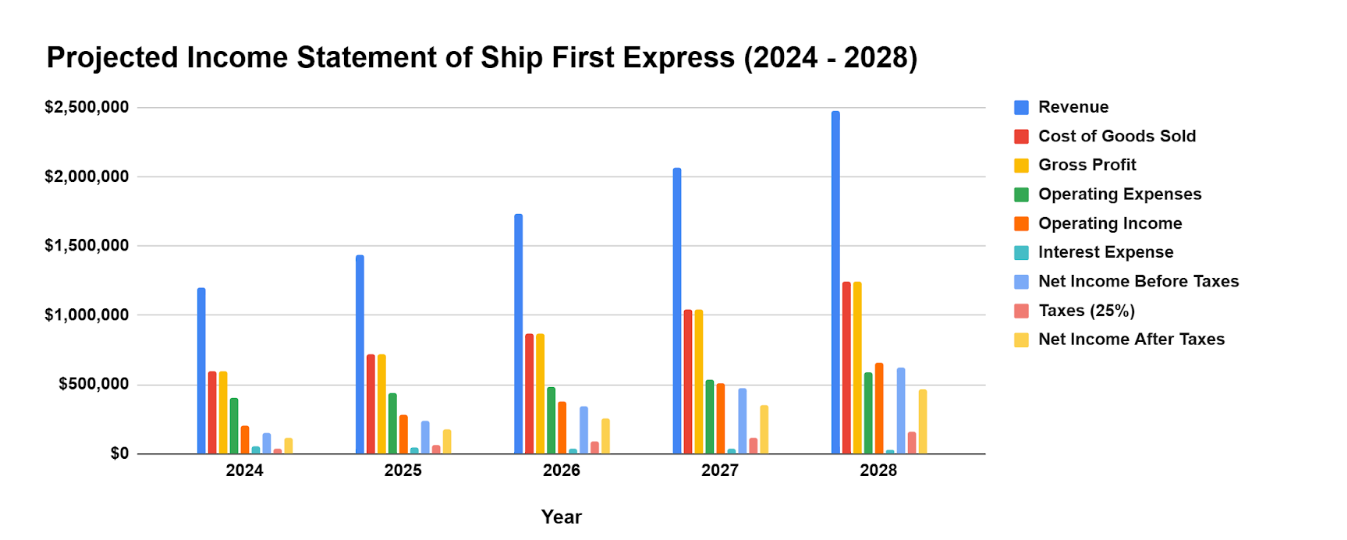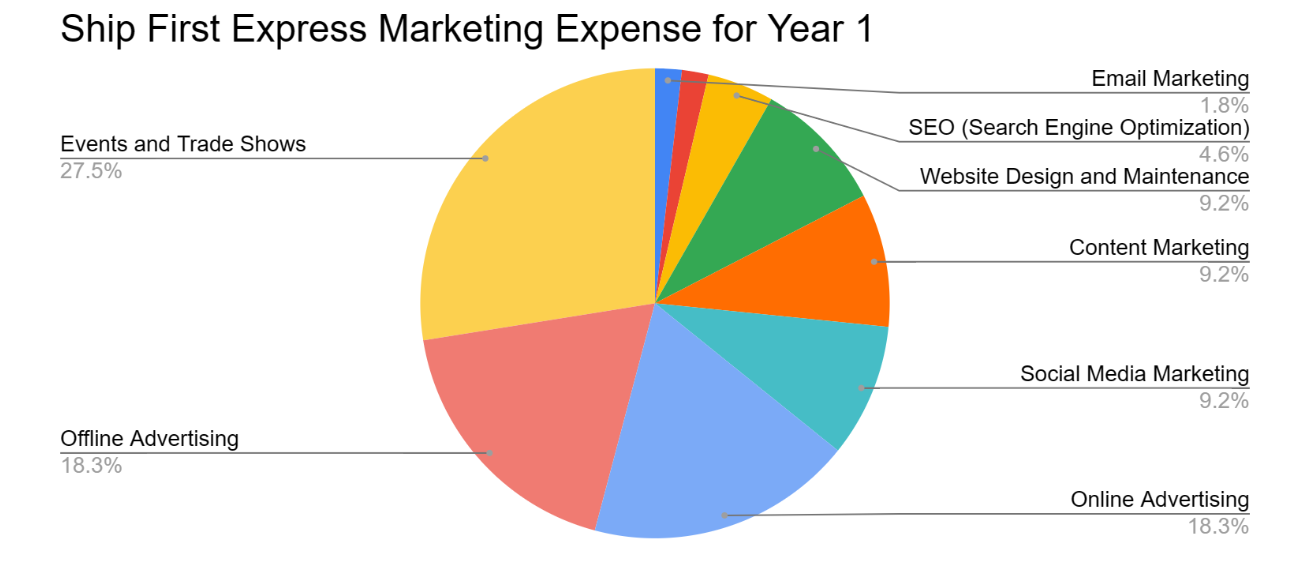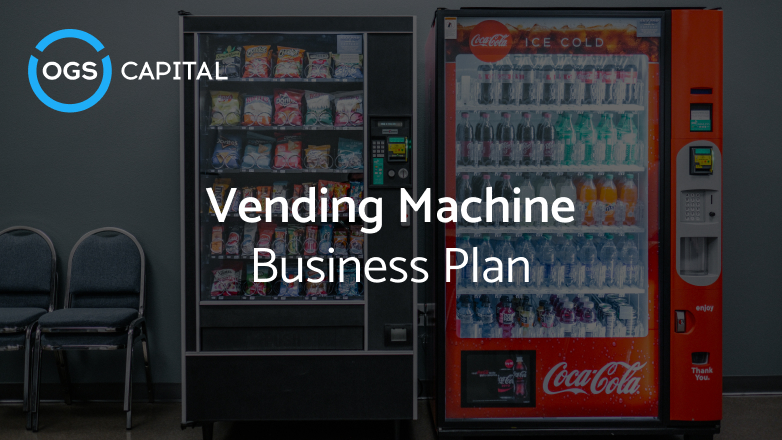Table of Content
What is a Business Plan for Freight Forwarding?
Do you want to start your freight forwarding business but don’t know where to begin? A freight forwarding business plan can help you. A freight forwarding business plan outlines a company’s goals, strategies, and financial projections. You can refer to our logistics business plan to delve deeper into the specifics.
A freight forwarding business helps you move your goods from point A to point B, using different ways of transport like planes, ships, trains, or trucks. A freight forwarding business is like a travel agent for your goods. It takes care of everything from booking the transport, clearing the customs, preparing the documents, insuring the goods, storing them, and delivering them to the final destination.
A good freight forwarding agency business plan will include the following sections:
- Executive summary
- Company overview and leadership
- Industry analysis
- Customer analysis
- Competitive analysis
- Sales and marketing plan
- Operations plan
- Financial plan
- Growth plan
Why Do You Need a Business Plan Sample for a Freight Forwarding Company?
A business plan sample can help you write your business plan faster and easier. A business plan sample like our freight broker business plan can help you to:
- Learn from the best practices and avoid the common mistakes of other freight-forwarding businesses
- Find out who your customers are and what they want from your services
- Discover how you can stand out from the competition and offer something unique and valuable
- Set realistic and measurable goals for your business and track your progress
- Plan your marketing strategy and budget to attract and retain customers
- Estimate how much money you need to start and run your business and how much profit you can make
- Get funding from investors or lenders if you need it
To help you get started, we have prepared a sample freight forwarding business plan bundle for you.
Executive Summary
The recently launched freight forwarder Ship First Express was started up in 2023 by long-time industry expert Matthew Sullivan. With headquarters in the Big Apple and storage facilities in LA, they use a worldwide network to give SMBs affordable and easy international delivery of goods by plane, ship, truck, along with customs paperwork, storage, and insurance.
Catering to booming sectors like online retail, medical and edibles, Ship First Express point of difference is providing a bespoke, adaptable, upfront and traceable experience. Ship First Express projects 20% annual revenue growth, from M in 2023 to .5M in 2028, by acquiring new clients, expanding services, enhancing its online presence, and forging strategic alliances.
To fuel further expansion, Ship First Express is looking to secure 0,000 in debt financing via a 5-year loan at 10% interest, to be repaid through steady cash flow. Their financials and credit profile show they can meet repayment obligations. With a commitment to customer service and worldwide connections, Ship First Express is on track to join the top players in freight forwarding.
Company Overview
Company Profile
Ship First Express is an international freight forwarding company headquartered in New York City. It was founded in 2023 by Matthew Sullivan, with over 15 years of experience. Ship First Express operates as a C-corporation and provides transportation and logistics services globally to small and medium-sized businesses (SMBs).
Services
Ship First Express is a full-service freight forwarder offering air freight, ocean freight, road freight, rail freight, customs brokerage, cargo insurance, warehousing, distribution, and supply chain management. Key services include:
- Air freight booking and consolidations
- Ocean freight FCL and LCL
- Road freight FTL and LTL
- Customs clearance and documentation
- Cargo business of pickup and delivery
- Warehousing and inventory management
- International distribution and fulfillment
- Supply chain optimization
Locations
The company’s headquarters and main office are located in New York City. Additional offices are in Los Angeles, London, Shanghai, and Sao Paulo. Warehouses are in New York, Los Angeles, London, and Shanghai.
Vision
To be the leading global provider of customized freight forwarding and value-added logistics solutions to SMBs.
Objectives
- Generate $1.2 million revenue by 2024
- Acquire 50 new clients by 2024
- Add rail freight and multimodal services by 2024
- Launch new website and app by 2024
- Establish a partnership with a global courier by 2024

Industry Analysis
The freight forwarding industry is a segment of the transportation and logistics industry. According to a report published by Grand View Research, here are some interesting stats regarding international freight forwarding business growth:
- Market size value in 2023 – USD 208.37 billion
- Revenue forecast in 2030 – USD 285.60 billion
- Growth rate – CAGR of 4.6% from 2023 to 2030
- Freight Forwarding Brokerages & Agencies Businesses in the US in 2023 – 82,188 (Source – IBISWorld)

Image Source – Grand View Research
The growth of the freight forwarding industry is driven by several factors, such as:
- Expanding international trade and cross-border e-commerce
- Globalization
- Infrastructure development
- Sustainability practices
Some of the current and future trends in the freight forwarding industry are:
- Digitalization and automation
- Advanced analytics and technologies (Blockchain, Internet of Things (IoT), cloud computing, and data analytics)
- Service diversification
- Industry consolidation (Mergers and acquisitions among large global forwarders)
- Customized services
Some of the key challenges for the freight forwarding industry are:
- Trade volatility
- Pricing pressures
- Complex customer requirements
- Regulatory compliance
- Recruitment and retention
Some of the opportunities and threats for the freight forwarding industry are:
- Geographic expansion
- Technology innovation
- Value-added services like consultancy, cargo insurance, and SCM.
- Cybersecurity risks
- New entrants
Some of the common regulations and laws that affect the freight forwarding industry are:
- IATA guidelines for air freight forwarding and documentation
- IMO regulations for ocean freight shipments and hazardous materials
- WCO standards for customs clearance, security, valuations
- National/regional industry-specific laws related to transportation, labor, contracts, and more.
- FIATA, IRU, GS1, CSCMP, and others maintained industry standards.
Customer Analysis
Ship First Express targets small and medium-sized businesses (SMBs) engaged in international trade that require freight forwarding services. It segments customers into four groups:
A. E-Commerce
- Online retailers and sellers who want fast, reliable, cost-effective shipping
- Prefer online booking, tracking, payment
- Price-sensitive, want discounts and promotions
- Pain points: customs, delays, damaged goods
B. Fashion
- Designers, manufacturers, wholesalers, retailers of fashion products
- Need flexible, customized, high-quality shipping
- Prefer personal service, tailored solutions, transparent pricing
- Quality-conscious, want reputation and trust
- Pain points: inventory, seasonal fluctuations, fashion trends
C. Electronics
- Producers, suppliers, and retailers of electronic products
- Need secure, efficient, innovative shipping
- Prefer digital service, smart solutions, competitive pricing
- Technology-driven, requiring innovation and efficiency
- Pain points: security risks, regulations, obsolescence
D. Healthcare
- Manufacturers, distributors, providers of healthcare products/services
- Need safe, compliant, professional shipping
- Prefer dedicated service, specialized solutions, premium pricing
- Regulation-bound, requiring compliance and safety
- Pain points: quality control, temperature, ethical issues
Ship First Express estimates each segment’s size and potential based on various criteria, as highlighted in our drop shipping business plan. Some of them include:
- Number of SMBs
- Average annual revenue
- Percentage exporting/importing
- Average spending on freight forwarding
Based on these criteria, Ship First Express calculates the size and potential of each customer segment as follows:
| Customer Segment | Number of SMBs | Average Annual Revenue | Percentage of International Trade | Average Annual Spending on Freight Forwarding | Size | Potential |
| E-commerce | 5000 | $1 million | 50% | $50,000 | $125 million | 10% |
| Fashion | 3000 | $2 million | 40% | $80,000 | $96 million | 15% |
| Electronics | 2000 | $3 million | 60% | $100,000 | $120 million | 20% |
| Health care | 1000 | $4 million | 30% | $120,000 | $36 million | 25% |
Competitive Analysis
Ship First Express operates in the freight forwarding industry. It faces competition from large multinationals like DHL, UPS, and FedEx to local firms like ABC Logistics.
Key Competitors
- DHL – Global leader in logistics offering express delivery, freight forwarding, warehousing, supply chain management, and e-commerce solutions. Although it has a strong brand and a large global network, its high costs and complex structure are its main drawbacks.
- FedEx – Global transportation and logistics services provider, including delivery, freight, customs brokerage, and trade consulting. Known for reliability, speed, customer service, large fleet, and quality but heavily dependent on the US and vulnerable to fuel costs.
- UPS – Global parcel delivery and logistics provider with services like freight forwarding, contract logistics, and distribution. Although it has a strong market position, large scale, broad portfolio, and high customer satisfaction, the company experiences low margins and high capital expenditures.
- ABC Logistics – Local US freight forwarding logistics company focused on SMB customers across sectors. Air/ocean/road freight, customs clearance, warehousing, and insurance are offered. ABC has the advantage of being cost-effective and adaptable, but its reach is limited, and it lacks brand awareness.
Competitive Strategy
To differentiate itself, Ship First Express:
- Leverages agent network for seamless global service
- Focuses on niche segments with high demand
- Provides personalized solutions and transparent pricing
- Enhances online presence and forms strategic alliances
Competitive Advantage
Ship First Express specializes in fast, reliable, cost-effective solutions for SMBs in international trade. Its tailored approach, flexibility, transparency, and global agent network set it apart.
Freight Forwarding Marketing Plan
Key Marketing Goals:
- Increase brand awareness and recognition
- Acquire new customers and retain existing ones
- Increase market share and revenue
- Enhance customer satisfaction and loyalty
Marketing Mix:
Ship First Express’s marketing mix elements are:
- Product – Wide range of freight services plus value-adds like packaging and inventory management. Tailored solutions to meet customer needs.
- Price – Competitive rates negotiated with carriers/partners. Transparent pricing. Discounts and promotions.
- Place – Headquarters and warehouse in NY, branch office, and warehouse in LA. A global network of agent partners.
- Promotion – Online – website, social, email, ads. Offline – sales calls, events, print, radio, TV.
Key Marketing Tactics:
Ship First Express’s marketing tactics and activities for each marketing mix element are:
- Conduct market research, monitor trends, and create value-added services.
- Analyze costs, benchmark pricing, and adjust based on market dynamics.
- Evaluate agents, maintain coordination, and expand network reach.
- Business development plan for a freight forward across channels based on objectives and metrics.
Performance Evaluation:
Ship First Express measures and evaluates its marketing performance by using various tools and methods:
- Website analytics using Google Analytics
- Social media analytics using Facebook Insights and Twitter Analytics
- Email marketing analytics using Mailchimp
- Online advertising analytics using Google Ads
- Online directory analytics using Yelp
- Online reviews analytics using Trustpilot
- Online platforms analytics using Amazon Analytics
- Sales analytics using Salesforce
- Referrals analytics using ReferralCandy
- Events analytics using Eventbrite
- Print media analytics using flyers with QR codes
Operations Plan
Key Business Activities and Processes
Ship First Express has the following key business activities and processes:
- Sales – The sales team generates leads, contacts prospects, presents proposals, closes deals, and signs contracts to acquire new customers and retain existing ones. Sales are made through cold calls, referrals, events, and online platforms.
- Service – The operations team coordinates and manages the transportation and logistics of customer shipments via air, ocean, road freight, etc.
- Support – The customer service team answers queries, resolves issues, and handles customer complaints through phone, email, chat, etc.
Resources, Equipment, and Tools
- Human Resources – 10 employees, including sales, service, operations, and accounting staff.
- Physical Resources – Two office and warehouse facilities in New York and Los Angeles.
- Financial Resources – $500,000 in capital to fund operations.
- Technology Resources – Software systems for sales, service, support, accounting, and collaboration.
Organization and Management
- Matthew Sullivan, Founder and CEO – Sets vision and oversees operations with 15 years of industry experience. Holds a degree in international business.
- Susan Anderson, Sales Manager – Leads the sales team, acquires new customers, and retains existing ones. Has 10 years of sales and marketing experience with a business administration degree.
- David Lee, Service Manager – Manages transportation and logistics. Has 8 years of operations and logistics experience with a supply chain management degree.
- Lisa Chen, Support Manager – Provides customer service and technical support. Has 6 years of experience in these areas and an IT degree.
- Charles Davis, Accounting Manager – Oversees finances, including cash flow, budgets, and audits. Has 5 years of accounting experience with an accounting degree.
Financial Plan
The following chart shows Ship First Express’s financial projections for the next five years:

The assumptions behind Ship First Express’s financial projections are:
- 20% annual revenue growth projected over 5 years based on market potential
- $50,000 average revenue per customer assumed
- 50% cost of goods sold as a percentage of revenue
- 50% gross margin target
- $400,000 operating expenses in year 1, 10% annual increase
- Operating margins targeted to increase from 16.7% to 26.4% over 5 years
- $50,000 interest expense in year 1 based on $500,000 loan at 10% over 60 months
- 25% tax rate assumed
- Net margins targeted to increase from 9.4% to 18.9% over 5 years
- $500,000 debt financing obtained for working capital, marketing, equipment, warehouse, recruitment
- 5 year loan at 10% interest, $10,616 monthly installments
- Assets pledged as collateral
Get Expert Assistance for Your Freight Forwarding Business Plan
With over 15 years under our belt, the team at OGSCapital has honed the ability to develop focused business plans that enable companies to effectively communicate their one-of-a-kind value to prospective investors and partners. One of our specialties is conveying the competitive advantages of freight forwarders while mapping out their operations in an easy to understand way. The business plans we create help entrepreneurs secure financing and chart an actionable course for growth.
If you’d like to talk about how OGSCapital’s consultants can develop a business plan for a freight forwarding company, customized to your needs and goals, please reach out. We also invite you to view a sample of our work with a drop shipping business plan available on our website.
Frequently Asked Questions
Is freight forwarding a profitable business?
Yes, freight forwarding is profitable if you have the right skills, network, and market knowledge. Freight forwarders can earn commissions from arranging freight transport for their clients and providing other value-added services such as customs clearance, insurance, and warehousing.
How to start a freight forwarding business?
To start a freight forwarder business, you need to understand the logistics industry, the regulations of different countries, and your customers’ needs. You also need a network of logistics partners, a business plan, and a self-storage feasibility study. You can find some tips on creating a business plan for a freight forwarding company by referring to our freight forwarding business plan template shared above.
Is freight forwarding a good career?
Freight forwarding is a good career for those who enjoy working in a dynamic environment, dealing with different cultures, and solving problems. Freight forwarders can learn about international trade, logistics, and supply chain management and advance their career in the freight forwarding business.
How can I start a freight forwarding business in the USA?
To start a freight forwarding business in the USA, you need to get a license from the Federal Maritime Commission (FMC), a bond or insurance, and comply with the laws and regulations of the US agencies. You can find more information about how to set up a freight forwarding company in the USA by consulting an expert.
OGSCapital’s team has assisted thousands of entrepreneurs with top-rate business plan development, consultancy and analysis. They’ve helped thousands of SME owners secure more than $1.5 billion in funding, and they can do the same for you.




















